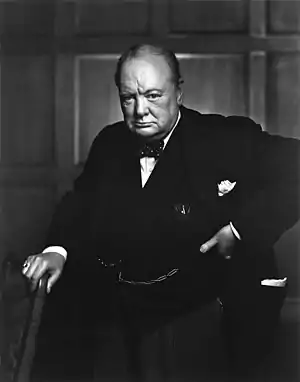International Churchill Society
The International Churchill Society (ICS), formerly known as the Churchill Centre, was founded in 1968 to educate new generations on the leadership, statesmanship, vision, courage and boldness of Sir Winston Churchill. Thousands of members around the world work together to impress the record of Churchill's life and deeds on the 21st century. The Society's exhibits are located at the Churchill War Rooms in London, and the National Churchill Library and Center at the George Washington University in Washington D.C.
 Winston S Churchill | |
| Formation | 1968 |
|---|---|
| Location |
|
Chairman | Laurence Geller CBE |
President | Randolph S Churchill |
| Website | www |
The Society sponsors an annual International Churchill Conference and numerous regional events honouring today's leaders; Churchill tours in Britain, Australia, France, South Africa and Morocco; academic symposia; student seminars; and the periodic Churchill Lecture, in which prominent world figures apply Sir Winston's experience to today's issues. With grants from the National Endowment for the Humanities, the Society has conducted seminars for high school teachers in the USA and UK.
The International Churchill Society is politically non-partisan, but not apolitical. Its quarterly journal, Finest Hour, often touches on Churchill's political philosophy and its relevance to today's issues. Speakers have spanned the political and cultural spectrum: William F. Buckley, Arthur Schlesinger, Jr, Alistair Cooke, William Manchester, Andrew Roberts, Lord Watson of Richmond, David Lough, Sir David Cannadine members of the Churchill family, and many others.
While the International Churchill Society's view of its subject is naturally positive, it is not hagiographic and publishes critiques as well as praise. According to Roosevelt-Churchill historian Warren Kimball, "Finest Hour has become a serious (and still entertaining) journal, earning the sobriquet 'The Journal of Winston Churchill,' which has taken Churchill from the clutches of the worshipful and given him over to the appreciative—those who can look at him, warts and all."
The most recent patron of the International Churchill Society was The Lady Soames LG DBE from 1983 until her death in 2014. She was youngest daughter of Winston Churchill and his wife Clementine Churchill. From 1970 to 1979, the patron was Lord Mountbatten of Burma.
The Society's offices are located in Washington, D.C. at the National Churchill Library and Center (NCLC).
History
The predecessor organizations were the Winston S. Churchill Study Unit (1968), a chapter of the American Topical Association, and The Churchill Centre. In 1995, responding to an appeal by Lady Soames, over 600 people around the world became founding members of the Society. In 2008 The Churchill Centre merged with the American Friends of the Churchill Museum, to form The Churchill Centre and Museum at the Cabinet War Rooms, London. In 2016, with the opening of the National Churchill Library and Center in Washington, D.C., The Churchill Centre was merged into a newly formed entity once again called the International Churchill Society which combined the memberships of The Churchill Centre and the Friends of the National Churchill Museum in Fulton, Missouri.
Among the original honorary members were The Baroness Clementine Spencer-Churchill; Randolph S. Churchill; The Rt. Hon. The Lord Stockton (Harold Macmillan); The Hon. W. Averell Harriman; Sir John Colville; The Rt. Hon. The Lord Soames (Christopher Soames) and Sir Winston's last private secretary, Sir Anthony Montague Browne, now all deceased. Current honorary members include General Colin Powell, The Baroness Thatcher (now deceased), Sir Martin Gilbert, Winston Churchill (grandson), The 11th Duke of Marlborough and Randolph Churchill (great grandson).
The National Churchill Leadership Center (NCLC)
The Society partnered with the George Washington University to create a library and museum[1] in Washington, DC. It opened on 29 October 2016.